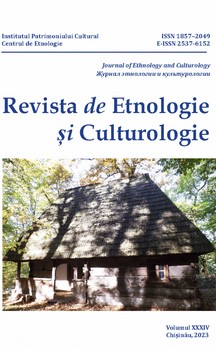Mișcarea socială a romilor din Republica Moldova (1991–2001): liderii și organizații
Roma Social Movement in the Republic of Moldova (1991–2001): leaders and organizations
Author(s): Svetlana ProcopSubject(s): Political history, Social history, Government/Political systems, Politics and society, Cultural Anthropology / Ethnology, Transformation Period (1990 - 2010), Ethnic Minorities Studies
Published by: Institutul Patrimoniului Cultural al Academiei de Științe a Moldovei
Keywords: Roma of the Republic of Moldova; social movement; leaders; organizations;
Summary/Abstract: In this article, we will present the process of formation of the Roma social movement in the Republic of Moldova, starting with its independence until the beginning of the new century. The creation of public organizations contributed to the beginning of the awakening of the ethnic consciousness of the Roma, which could not but have a positive impact on the processes occurring among the Roma ethnic community. Only in the period 1991–2001, about ten public organizations were accredited in the Republic of Moldova, whose formation was related to the task of social protection and supporting the cultural development of the Roma community in the Republic of Moldova. One of the first socio-cultural organizations created in the 1990s was the Association “Romii Moldovei” (1990), whose president was Pavel Andreichenko. In 1997, Artur Cerari, a Gypsy baron, was elected president of the northern society “Romii Moldovei”. In the same year, the Association of Roma Women “Juvlia Romani” was created, headed by Ecaterina Drosu, a doctor by profession. A year later, the Association “Terminatago-Rroma” (Gypsy Youth) was created (1998), whose president was Pavel Andreichenko (junior). The ethno-social-cultural-educational association “Bakhtalo Rom” (1999), headed by the famous Romani poet and translator Anatol Raditsa, was created to solve the problem of guaranteeing education in schools from places where Roma live compactly, in the native language of the Roma – Romani.
Journal: Revista de Etnologie şi Culturologie
- Issue Year: XXXIV/2023
- Issue No: 2
- Page Range: 38-48
- Page Count: 11
- Language: Romanian

